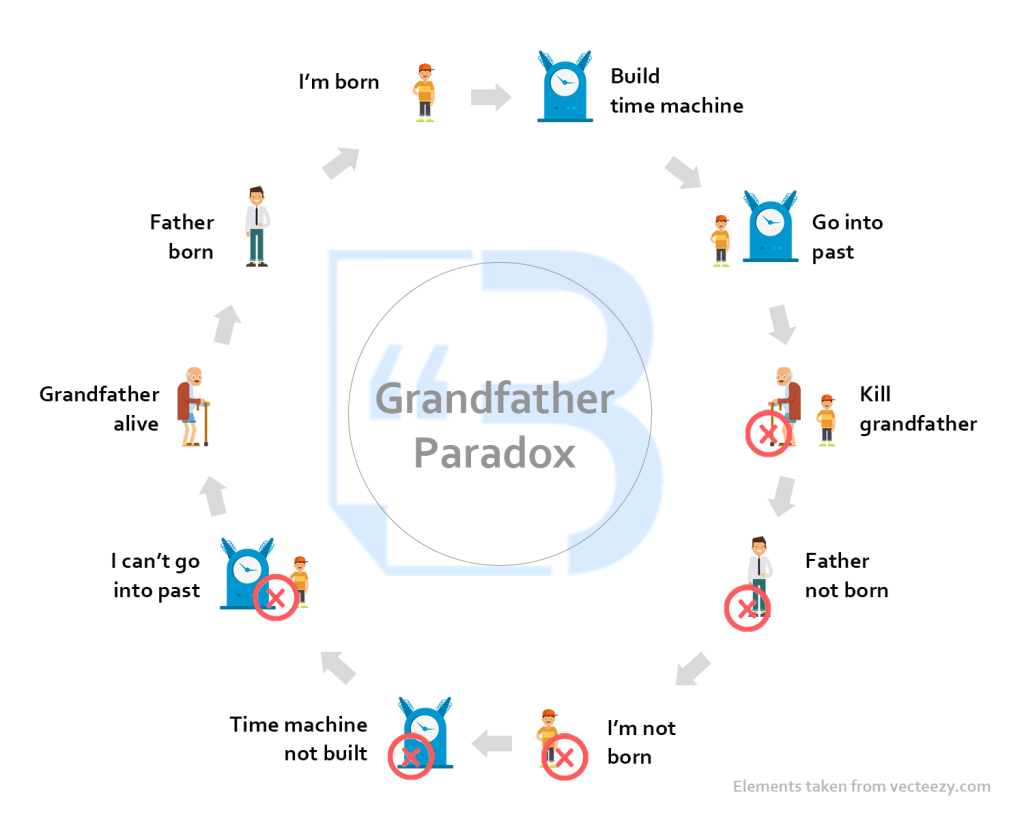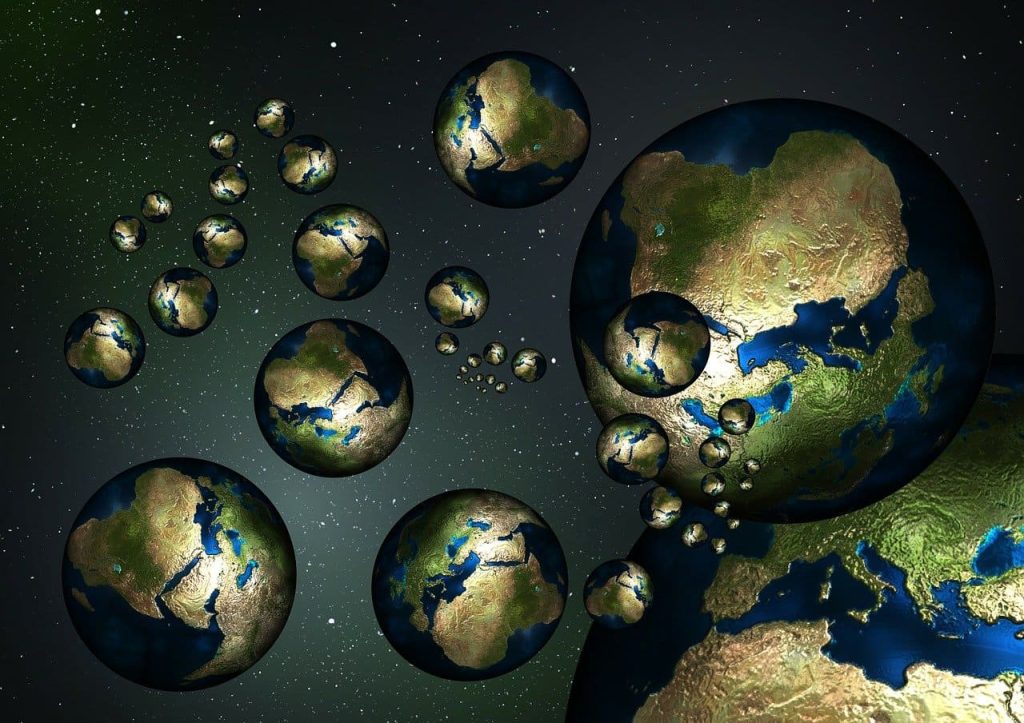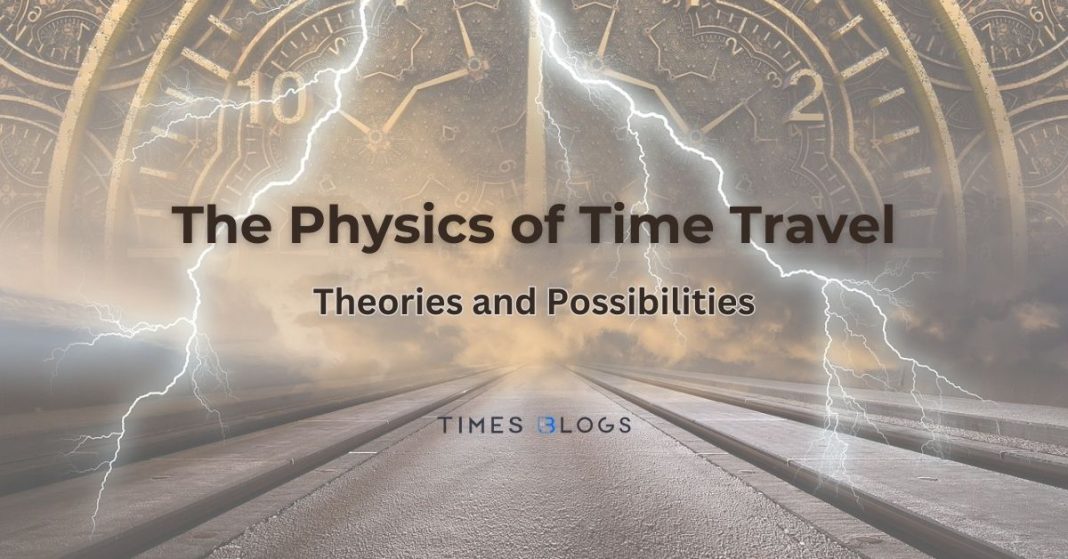Time travel has long been a fascinating concept in both science fiction and scientific discussions. The idea of journeying through time, whether it be to the past or the future, captivates our imagination and raises intriguing questions about the nature of time itself. In this blog post, we will delve into the physics of time travel, exploring various theories and possibilities that have been put forward by physicists and researchers. Join us on this mind-bending journey as we explore the intricacies of time travel and its potential implications.
Table of Contents
Understanding Time
The Arrow of Time
Time, as we experience it in our everyday lives, flows in a particular direction—forward. This unidirectional flow is known as the “arrow of time” It is closely tied to the concept of entropy, which measures the level of disorder in a system. According to the second law of thermodynamics, the entropy of a closed system tends to increase over time, leading to the observed directionality of time.
The arrow of time is evident in various aspects of our lives. We experience events unfolding from the past to the present and into the future. We can remember events that have already occurred, but we cannot remember events that have not yet taken place. This inherent directionality of time sets the stage for the fascinating concept of time travel.
Time Dilation
One of the fundamental ideas in physics is that time is not absolute; it is relative to the observer’s frame of reference. This concept is captured in Einstein’s theory of relativity, which predicts time dilation. Time dilation refers to the phenomenon where time appears to pass at different rates for observers moving at different speeds or in the presence of gravitational fields. This effect has been experimentally confirmed and plays a crucial role in understanding the possibilities of time travel.
The theory of relativity states that the passage of time is influenced by the relative motion between observers. When an object moves at high speeds relative to another, time slows down for the moving object. This phenomenon, known as time dilation, is a consequence of the interplay between space and time.
For example, consider a scenario where two observers, A and B, are moving relative to each other at a significant fraction of the speed of light. From the perspective of Observer A, time appears to pass slower for Observer B. Conversely, from the perspective of Observer B, it is Observer A’s time that seems to be dilated. This phenomenon has been observed in experiments involving high-speed particles and is an essential aspect of the theory of relativity.
Furthermore, time dilation also occurs in the presence of strong gravitational fields. According to general relativity, the curvature of spacetime near massive objects, such as black holes, causes time to slow down for observers in their vicinity. This effect has been verified through precise measurements and is critical in our understanding of the universe’s behavior on a cosmic scale.
Time dilation, as predicted by the theory of relativity, raises intriguing possibilities for time travel. By manipulating the relative motion or gravitational fields, it may be conceivable to experience time passing at a different rate than that of the surrounding world. However, the challenges and limitations associated with such feats are yet to be fully understood and overcome.
Theories of Time Travel
The Grandfather Paradox
The Grandfather Paradox is a classic thought experiment that highlights the potential paradoxes and logical inconsistencies that arise from traveling back in time. The scenario involves a person going back in time and preventing their own birth or causing harm to their ancestors. This paradox raises questions about the compatibility of time travel with causality and the potential consequences of altering the past.

Imagine a person named Alex who invents a time machine and decides to travel back in time to a point before their grandparents met. In this scenario, Alex’s intention is to prevent their grandparents from ever meeting, thus ensuring that Alex is never born. However, if Alex succeeds in this mission, it creates a paradox. If Alex is never born, then they cannot travel back in time to prevent their own birth, which leads to a contradiction.
The Grandfather Paradox illustrates the potential complications that arise when considering the ability to alter the past through time travel. It challenges the notion of cause and effect, suggesting that changing the past can have unforeseen consequences and may even lead to self-contradictory situations.
Wormholes and Black Holes
Wormholes are hypothetical tunnels in spacetime that could connect two distant regions or even different points in time. The concept of wormholes gained popularity through Einstein’s theory of general relativity, which allows for the existence of such shortcuts in spacetime. Black holes, on the other hand, are regions of spacetime with extremely strong gravitational fields, and they also play a significant role in discussions about time travel.
According to some theories, traversing a wormhole or utilizing the properties of a black hole could potentially enable time travel. The idea is that these cosmic phenomena create warps in spacetime, allowing for shortcuts or paths that bend the traditional linear flow of time. By entering a wormhole or venturing close to a black hole’s event horizon, it is hypothesized that one might be able to access different points in time or even travel to the past or future.

However, the practical realization of utilizing wormholes or black holes for time travel remains highly speculative. The immense gravitational forces and extreme conditions near black holes pose significant challenges and unknowns. Additionally, the stability and existence of traversable wormholes are still subjects of ongoing research and exploration.
Cosmic Strings
Another theoretical possibility for time travel involves the concept of cosmic strings. These cosmic strings are hypothetical objects that are thought to be incredibly long and thin, potentially stretching across the entire universe. If cosmic strings exist and were to be manipulated or harnessed, they could create “closed timelike curves” that may allow for time travel.
Closed timelike curves are paths in spacetime that, if followed, would enable a person or object to return to their own past. The existence and properties of cosmic strings, as well as the feasibility of harnessing their power, are topics of active investigation within the realm of theoretical physics.
Possibilities and Limitations
Novikov Self-Consistency Principle
The Novikov Self-Consistency Principle, proposed by Russian physicist Igor Novikov, suggests that the laws of physics would prevent any changes to the past that would create paradoxes. According to this principle, if someone were to travel back in time, their actions would be constrained in such a way that they would not be able to change the past in a significant manner. Instead, their actions would already be part of the timeline, ensuring that the events unfold exactly as they were observed in the future.
For example, imagine a scenario where a time traveler attempts to prevent a disastrous event from occurring in the past. According to the Novikov Self-Consistency Principle, the time traveler’s actions would ultimately fail, either due to unforeseen circumstances or the unintended consequences of their actions. This principle maintains the self-consistency and stability of the timeline, avoiding the creation of paradoxes.
The Novikov Self-Consistency Principle offers a potential solution to the Grandfather Paradox and other paradoxes that arise from changing the past. It suggests that time travel to the past may be possible, but any actions taken would already be predetermined and consistent with the existing timeline, preventing any significant alterations.
Parallel Universes and Many-Worlds Interpretation
The concept of parallel universes, stemming from the Many-Worlds Interpretation in quantum mechanics, provides another perspective on time travel possibilities. According to this interpretation, every possible outcome of an event exists in a separate universe. In the context of time travel, this theory suggests that traveling to the past would not change our own timeline but would create a divergent timeline in a parallel universe.

In this view, if someone were to travel back in time and alter events, they would not change their own past but instead create a new timeline branching off into a separate parallel universe. This idea allows for time travel without causing paradoxes, as the original timeline remains intact while a new timeline is formed.
While the concept of parallel universes and the Many-Worlds Interpretation provide a potential framework for time travel, it also raises questions about the practicality and accessibility of interacting with these parallel timelines. The ability to navigate between different universes and influence events across them remains largely speculative and beyond our current scientific understanding.
Causality and Determinism
The principles of causality and determinism pose significant challenges and limitations to the possibility of time travel. Causality suggests that events are caused by preceding events and the laws of nature, creating a cause-and-effect relationship. If time travel were to allow changes to the past, it could potentially disrupt this cause-and-effect chain, leading to logical inconsistencies and contradictions.
Determinism, the philosophical concept that all events are determined by previous events and the laws of nature, further complicates the feasibility of time travel. If all events are predetermined, then the notion of changing the past becomes paradoxical. Time travel would either be rendered impossible or would already be predetermined and accounted for within the existing timeline.
The intricate relationship between cause and effect in the context of time travel continues to be a subject of debate and exploration among physicists and philosophers. Resolving the challenges posed by causality and determinism is crucial in understanding the boundaries and possibilities of time travel.
Experimental Approaches
The Twin Paradox
The Twin Paradox is a famous thought experiment that explores the effects of time dilation in the context of special relativity. It involves a pair of twins, where one twin stays on Earth while the other travels at high speed through space and then returns to Earth. The traveling twin experiences time passing more slowly due to their relative motion, resulting in a smaller amount of time elapsed for them compared to the twin who remained on Earth.
The Twin Paradox demonstrates the practical implications of time dilation and provides insights into the nature of time travel. Although the effect is on a small scale and not applicable to traveling significant distances through time, it serves as a starting point for understanding the relationship between velocity, time dilation, and the passage of time.
Time Travel in Relativity
The theory of relativity, both special and general, provides a foundation for understanding the physics of time travel. Experimental approaches based on relativity theory have been devised to test the principles and effects associated with time dilation and its implications for time travel.
For example, atomic clocks have been used in experiments involving high-speed travel or placing clocks in regions with different gravitational fields. These experiments have confirmed the predictions of time dilation, albeit on a small scale. They demonstrate that time can indeed be influenced by motion and gravity, supporting the fundamental principles that underpin the concept of time travel.
While these experiments provide valuable insights into the physics of time dilation and its connection to time travel, they are limited in their scope and practicality for actual time travel scenarios. The effects observed in these experiments are minute and do not enable significant leaps through time.
Quantum Entanglement and Time Travel
Quantum entanglement, a phenomenon in quantum mechanics where particles become intrinsically linked regardless of the distance between them, has also been suggested as a potential avenue for time travel.
The concept involves manipulating entangled particles in such a way that their states can be used as a means of communication between the past and the future. By altering the state of one entangled particle, it is hypothesized that information could be transmitted to the past or the future, effectively influencing events across different points in time.
However, the practicality and feasibility of using quantum entanglement for time travel remain highly speculative. The challenges of creating and maintaining entangled particles over extended periods, as well as the complexities of manipulating them to transmit meaningful information, pose significant obstacles that are yet to be overcome.
Experimental approaches based on quantum entanglement are at an early stage, and further research and technological advancements are needed to explore the true potential of this phenomenon for time travel.
Ethical and Philosophical Considerations
Altering the Past
One of the ethical and philosophical considerations surrounding time travel is the question of whether it is morally acceptable to alter the past. If time travel were possible and one could change the course of history, it raises concerns about the potential consequences and unintended effects of such actions.
The “butterfly effect” is a concept often referenced in discussions about altering the past. It suggests that even minor changes in the past could have significant and unpredictable ramifications in the future. This idea raises ethical dilemmas regarding the responsibility and potential harm that could arise from altering historical events, potentially impacting the lives of countless individuals.
Moreover, the preservation of historical integrity and the authenticity of human experiences become important factors to consider. If the past can be changed at will, the reliability of historical records, cultural heritage, and personal memories could be compromised. The preservation of truth and the integrity of the past may conflict with the desire to manipulate events for personal or collective gain.
b. Predestination and Free Will: Time travel also invites contemplation about the interplay between predestination and free will. If one could travel to the past or future, does that imply a predetermined destiny or a fixed timeline? Alternatively, does it allow for the possibility of altering events and exercising free will in the face of predetermined circumstances?
The philosophical debate surrounding determinism and free will intersects with the concept of time travel. Determinism proposes that all events are determined by previous events and the laws of nature, suggesting that the future is already set. If this were the case, time travel would be bound by predestined events, limiting the ability to change the course of history.
However, if time travel were to allow for alterations to the past, it raises questions about the nature of free will and the potential to change the predetermined trajectory of events. The philosophical implications of reconciling free will with the ability to manipulate the past remain complex and continue to be debated.
Responsibility and the Grandfather Paradox
The Grandfather Paradox, mentioned earlier, presents a specific ethical and philosophical consideration. If time travel were possible and one could travel to the past, the question arises: What responsibilities do individuals have regarding the consequences of their actions?
The Grandfather Paradox suggests that altering the past could lead to paradoxical situations, such as preventing one’s own existence. This raises moral dilemmas about the potential harm caused by time travelers and their responsibility to ensure the stability and integrity of the timeline.
The concept of personal responsibility extends beyond the individual level to considerations of collective responsibility. How would society regulate and manage the ethical implications of time travel? Would there be rules or governing bodies to oversee its use and prevent misuse or unintended consequences?
Concluding Remarks
The physics of time travel is a captivating and multidimensional topic that blends scientific principles, theoretical frameworks, and philosophical inquiries. While many theoretical possibilities exist, the practical realization of time travel remains uncertain. The exploration of time travel not only expands our understanding of the universe but also challenges our perceptions of time, causality, and the nature of reality itself. As researchers continue to delve into this fascinating realm, new discoveries and insights may shed light on the mysteries surrounding time travel.
In conclusion, the physics of time travel presents us with a complex tapestry of theories, possibilities, and limitations. While we have explored concepts such as the arrow of time, time dilation, the Grandfather Paradox, wormholes, cosmic strings, and parallel universes, the field is still ripe with unanswered questions. The Novikov self-consistency principle offers a potential solution to paradoxes, while the Many-Worlds Interpretation and the principles of causality and determinism challenge our understanding of cause and effect.
Experimental approaches like the Twin Paradox, time travel in relativity, and the potential link between quantum entanglement and time travel provide glimpses into the practical aspects of time travel, albeit on a limited scale. Ethical and philosophical considerations further deepen our contemplation, raising questions about altering the past, the balance between predestination and free will, and the responsibility that comes with manipulating time.
As we continue to push the boundaries of scientific exploration, it is crucial to approach the subject of time travel with a blend of curiosity, critical thinking, and an appreciation for the inherent complexity it entails. While time travel remains firmly within the realm of scientific and theoretical speculation, the ongoing research and exploration of its possibilities fuel our imagination and inspire us to unravel the mysteries of time itself.
So, the next time you find yourself daydreaming about traveling through time, remember that the physics of time travel is a fascinating journey into the unknown, one that challenges our understanding of the universe and invites us to ponder the profound nature of time.




